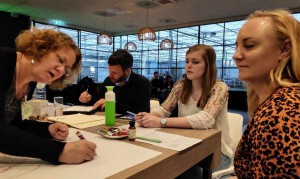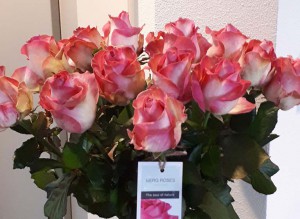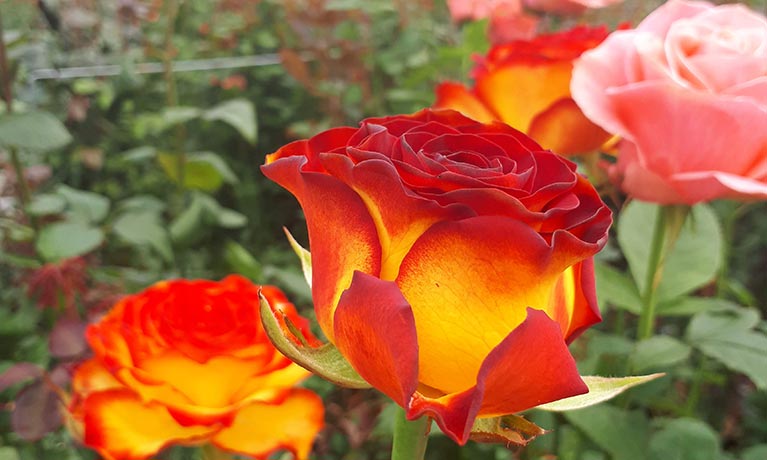By David Bek, Jill Timms and Nora Lanari
What needs to be done to improve the sustainability footprint of the global cut-flower industry?
The UK imports 90% of its cut-flowers from abroad, including the Dutch Auction, Latin America, and East Africa (Mintel 2015). But, whilst the industry is an engine for economic growth in these source countries, there are many environmental, social, and political challenges. CBiS researchers David Bek and Jill Timms launched the Global Cut-flower Production Network Project in 2016 to better understand the challenges faced by the industry and to develop initiatives in partnership with stakeholders to implement better practices.
In 2017, the project’s first multi-stakeholder workshop was held in Coventry where the group sought to map out the industry’s sustainability challenges. A second workshop was held at MMUK’s retailer supply facility in May 2018, and in April 2019, a third event was hosted in Aalsmeer, The Netherlands, by wholesaler Fleurametz and grower Dümmen Orange. An important feature of these workshops has been the diversity of interest groups represented, including: UK retail, retail suppliers, growers, florists, wholesalers, auction house, industry associations, NGOs and certification bodies.
Two discussions dominated our third workshop:
- how effective are standards and certifications in driving progressive change?
- what concrete actions can different participants take to drive and embed sustainability in the global cut-flower industry?
The future of Standards and Certifications in the Cut-flower Industry
 The Invisibility Puzzle – While private and social standards are becoming increasingly important for flower growers to successfully participate in global markets; wholesalers, florists, and consumers remain largely unaware of these certification efforts at the production stage. We call this phenomenon the ‘Invisibility Puzzle’.
The Invisibility Puzzle – While private and social standards are becoming increasingly important for flower growers to successfully participate in global markets; wholesalers, florists, and consumers remain largely unaware of these certification efforts at the production stage. We call this phenomenon the ‘Invisibility Puzzle’.
Purpose and Limits of Certification – Currently, compliance with most private and social standards is assessed through an audit. But such compliance-based audits are not able to dig into more complex issues. For example, they cannot address structural problems such as racism and gender discrimination, nor do they mitigate the effects of extremely precarious, low waged labour on family life. While certifications and standards have been key to get the sustainability discussion started, they have clear limits and the inception of the Floriculture Sustainability Initiative is an exciting step forwards in deepening the impact of certifications within the industry.
The Continuous Improvement Model – A promising new development within the design of standards is the incorporation of an approach based on continuous improvement. Instead of merely undergoing compliance based audits, rated on a risk-based system, individual producers are assessed based on how they improve over time, both against themselves and their peers. This has two advantages:
- First, the social, economic, and environmental characteristics of farms can be vastly different not only across the world, but even within countries. Comparing flower growers across the board can lead to distorted requirements that just do not work in all contexts.
- Second, by assessing individual flower grower’s performance over time, interventions designed to improve performance can be targeted in relation to their specific social, economic and environmental realities. As a result, farms can adopt increasingly sustainable practices and become more resilient and productive as a result.
What is our group doing to improve sustainability in the cut-flower Industry?
 Making Information Accessible to Florists – Many florists are unaware that some of the flowers they buy and sell are certified at the production stage. We want to make these efforts visible to florists and to help florists better understand what the certifications mean so that they can communicate effectively with their customers about their sustainability credentials.
Making Information Accessible to Florists – Many florists are unaware that some of the flowers they buy and sell are certified at the production stage. We want to make these efforts visible to florists and to help florists better understand what the certifications mean so that they can communicate effectively with their customers about their sustainability credentials.
- We are co-producing a leaflet that summarises information about existing sustainability initiatives to help florists recognise standards and certifications, and to talk to their customers about them. We are aiming to roll out a pilot with florists in the second half of 2019.
- We are already collaborating with the British Florist Association (BFA) and other stakeholders, with a view to mainstreaming sustainability awareness in floristry education and practice.
Raising Consumer Awareness – If consumers request more sustainable flowers, florists will provide them. So far, many people are unaware of the certifications and standards used within the cut-flower market. For example, Fairtrade has a thematic focus on flowers, but very few consumers link Fairtrade to flowers. We are working with Fairtrade in the UK to raise the profile of Fairtrade flowers, and with that, wider consumer awareness. We are also working with UK-based producers to support the development of markets for local and seasonal flowers.
Deepening the Multi-Stakeholder Approach – Our three multi-stakeholder workshops have prov-en very fruitful and inspiring. We have formed a Steering Committee which will help to drive initiatives forward in the coming months and years. Furthermore, we are planning to take our next workshop to Kenya and involve participants from local flower farms, including workers.
This project is an excellent example of research feeding into impact activities which make a real difference to practices in behaviours from production to consumption within supply chains. If you are interested in this work and would to know more or become involved, then please get in touch with Dr David Bek or Dr Jill Timms a or follow them at @DaveDBRS and @JillLTimms.
The work outlined in this Blog has been shortlisted as a Finalist in the UK and Ireland Green Gown Awards 2019 ‘Research with Impact (institution) category’, sponsored by Emerald Publishing under the project title, ‘Promoting sustainability within the cut-flower industry’. The outcome of this nomination will be announced on 26th November 2019 at a Ceremony at the Glasgow Science Centre.
References
Bek, D. Bryan, A. Timms, J. 2017 Say it with Flowers. Working with the industry to reconsider the ethics of the supply chain.
Bek, D., Despoudi, S., Lanari, N. 2018 Less is More in Retail Supply Chains.
Gitonga, A. 2018 Rogue Day Care Centres Drug Babies to make them Sleep.
Mintel (2015). Cut Flowers and Houseplants – UK – February 2015 Executive Summary, February 2015. Mintel Group Ltd: London.
Timms, J. Bek, D. 2019 Valentine’s Day: five ways to ensure your flowers are ethical.





Comments are disabled